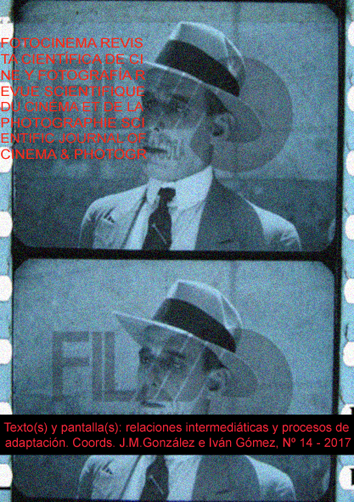Reconfigurations of the classical hero in the digital age: Aaron Sorkin’s The Social Network and Steve Jobs.
DOI:
https://doi.org/10.24310/Fotocinema.2017.v0i14.3597Palabras clave:
biografías fílmicas, Biopic, Aaron Sorkin, La red social, Steve Jobs, David Fincher, Danny Boyle, Biographical Films, The Social NetworkResumen
The movies The Social Network (David Fincher, 2010) and Steve Jobs (Danny Boyle, 2015) are biographies of two outstanding figures in the digital revolution: the young multimillionaire Mark Zuckerberg, Facebook co-founder and CEO, and the famous co-founder and executive chairman of Apple, Steve Jobs. Written by the renowned screenwriter Aaron Sorkin, what these two movies have in common is that they present different orders or layers of meaning, allowing us to see beyond the life of the protagonists in the interpretation. Sorkin, in both stories, delves deeply into the psychological characteristics of the geniuses. In addition, in both cases, he creates a dramatic character, which can be identified with archetypes and familiar figures from western narrative, the tragic hero and the narcissist. But additionally, he shows these characters as icons of our times and through them presents a reflection on nowadays and the impact the digital revolution has had in the last few decades.Descargas
Métricas
Publicación Facts
Perfil de revisores N/D
Información adicional autores
Indexado: {$indexList}
-
Indexado en
- Sociedad Académica/Grupo
- N/D
- Editora:
- Universidad de Málaga
Citas
Aristotle. Poetics. (ed. 1997) Montreal: McGill Queen’s University Press.
Barbosa Sánchez, A. (2011-2012). El arquetipo mítico de Narciso en la cultura posmoderna. Inventio, la génesis de la cultura universitaria en Morelos, nº15, 75-83.
Bordwell, D. (1989). Making Meaning. Inference and Rethoric in the Interpretation of Cinema. Cambridge: Harvard UP.
Boyle, D. (2015). Steve Jobs. US: Universal Pictures.
Bunbury, S. (2016). Aaron Sorkin on ethics, the perils of writing about real people and Steve Jobs as a world ruler. The Sydney Morning Herald. http://www.smh.com.au/entertainment/movies/aaron-sorkin-on-ethics-the-perils-of-writing-about-real-people-and-steve-jobs-as-a-world-ruler-20160125-gmdf4l.html
Burgo, J. (2011). A Portrait of A Narcissistic Personality Disorder in ‘The Social Network.’Afterpsychotherapy. http://www.afterpsychotherapy.com/narcissistic-personality-disorder/).
Carr, D. (2015). Unease for what Microsoft’s HoloLens will mean for our screen-obsessed lives. The New York Times. http://www.nytimes.com/2015/01/26/business/media/unease-for-what-microsofts-hololens-will-mean-for-our-screen-obsessed-lives.html?_r=0®ister=google
Carr, D. (2011). The Shallows: What the internet is doing to our brain. New York: Norton.
Connelly, B. (2015). Aaron Sorkin interview: writing Steve Jobs. Den of Geek. http://www.denofgeek.com/movies/aaron-sorkin/aaron-sorkin-interview-steve-jobs#ixzz4F37noqP4
Custen, G. F. (1992). Bio/Pics. How Hollywood Constructed Public History. New Brunswick, NY: Rutgers.
Deutelbaum, M. (2016). ‘The Social Network’ screenplay: Adaptation as (re)interpretation and (re-)creation. Journal of Screenwriting, 7(1), pp. 29-44.
Fincher, D. (2010). The Social Network. US: Columbia Pictures.
Foundas, S. (2010). Revenge of the Nerd. Film Comment, Sept-Oct., pp. 38-42.
Frye, N. (1950). Levels of Meaning in Literature. The Kenyon Review, 12 (2), pp. 246-262.
Goleman, D (2013). Focus, The Hidden Driver of Excellence. NY: Harper Collins.
Gregg, H. (2012). Was Steve Jobs narcissim justified?, Psychology Today. https://www.psychologytoday.com/blog/theory-knowledge/201201/was-steve-jobs-narcissism-justified)
Harris, M. (2010). Inventing Facebook. New York Times Magazine, http://nymag.com/movies/features/68319/
Heilbrun, C. (1993). Is biography Fiction? Soundings, 76 (2-3), 383-406.
Holland, N. (2010). The Social Network, Asperger’s, and your Brain. Psychology Today. https://www.psychologytoday.com/blog/is-your-brain-culture/201011/the-social-network-aspergers-and-your-brain
Jonason, P.K & Schmitt, D. P. (2012). The antihero in popular culture: Life history theory and the dark triad personality traits, Review of General Psychology, 16 (2), 192–199.
Jones, Kent (2010). Only Connect. Sight & Sound, 20 (11), 34-36.
Lowen, A. (1997). Narcissism. New York: Simon & Schuster.
Minier, M. & Pennacchia, M. (2014). Adaptation, Intermediality and the British Celebrity Biopic. Surrey, UK: Asghate.
Moss, L. (2012). The Tragic Paradox. Lanham (ML): Lexington.
Wallace-Wells, D. (2015). How Aaron Sorkin Designed Steve Jobs. Vulture. http://www.vulture.com/2015/10/how-aaron-sorkin-designed-steve-jobs.html)
Opam, K. (2015). Portrait of a broken man. The Verge. http://www.theverge.com/2015/10/6/9461209/steve-jobs-movie-review-aaron-sorkin-danny-boyle-michael-fassbender).
Ricoueur, P. (1975). La métaphore vive. Paris: Seuil.
Rodriguez Adrados, F. (1962). El héroe trágico. Cuadernos de la Fundación Pastor, 6, 11-35.
Rosenstone, R. (2006). History on Film, Film on History. Harlow: UK, Pearson.
Rosenstone, R. (2007). In praise of the biopic. In Francaviglia, R. & Rodnitzky, J. Light, Camera, History. Portraying the past in film (pp. 11-29), Texas: Texas A&M.
Sánchez-Escalonilla, A. (2014). Estrategias de guion cinematográfico. Barcelona: Ariel.
Scott, A. O. (2015). ‘Steve Jobs,’ Apple’s visionary C.E.O. dissected. New York Times, http://www.nytimes.com/2015/10/09/movies/review-steve-jobs-apples-visionary-ceo-dissected.html.
Sorkin, A. (2010). The Social Network Screenplay. Available online. http://flash.sonypictures.com/video/movies/thesocialnetwork/awards/thesocialnetwork_screenplay.pdf
Sorkin, A. (2010). ‘The Social Network’ Production notes: Q&A Script Writer. http://www.cinemareview.com/production.asp?prodid=6082.
Sorkin, A. (2015). Steve Jobs Screenplay. Available online, http://screenplays15.universalpictures.com/stevejobs/Steve_Jobs_Screenplay.pdf
Turkle, S. (2011). Alone Together. Why We Expect More from Technology and Less from Each Other. New York: Basic Books.
Verini, B. (2010). The truth (¿) about Facebook? Script Magazine, 16 (5), 52-57.
Wallace-Wells, D. (2015) How Aaron Sorkin Designed Steve Jobs. Vulture. http://www.vulture.com/2015/10/how-aaron-sorkin-designed-steve-jobs.html.
Publicado
Cómo citar
Número
Sección
Licencia
Todos los contenidos publicados en Fotocinema. Revista científica de cine y fotografía están sujetos a la licencia Creative Commons Reconocimento-NoComercia-Compartirigual 4.0 cuyo texto completo puede consultar en <http://creativecommons.org/licenses/by-nc-sa/4.0>
Se pueden copiar, usar, difundir, transmitir y exponer públicamente, siempre que:
- Se cite la autoría y la fuente original de su publicación (revista, editorial y URL de la obra).
- No se usen para fines comerciales.
- Se mencione la existencia y especificaciones de esta licencia de uso.
Los derechos de autor son de dos clases: morales y patrimoniales. Los derechos morales son prerrogativas perpetuas, irrenunciables, intransferibles, inalienables, inembargables e imprescriptibles. De acuerdo con la legislación de derechos de autor, Fotocinema. Revista científica de cine y fotografía reconoce y respeta el derecho moral de los autores/as, así como la titularidad del derecho patrimonial, el cual será cedido a la Universidad de Málaga para su difusión en acceso abierto. Los derechos patrimoniales, se refieren a los beneficios que se obtienen por el uso o divulgación de las obras. Fotocinema. Revista científica de cine y fotografía se publica en open access y queda autorizada en exclusiva para realizar u autorizar por cualquier medio el uso, distribución, divulgación, reproducción, adaptación, traducción o transformación de la obra.
Es responsabilidad de los autores/as obtener los permisos necesarios de las imágenes que están sujetas a derechos de autor.














13.png)



